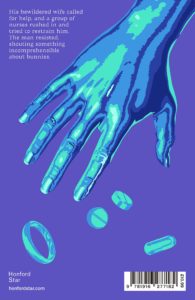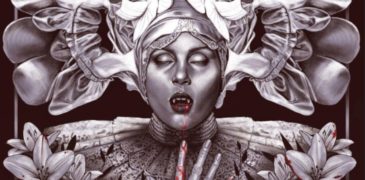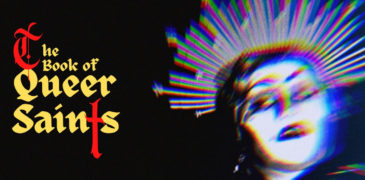
“Capitalism is nothing before the forces of love and passion!” So declares an impossibly pregnant woman’s stalker in The Embodiment, the second story in this intricate puzzle box of a collection from Korean author Bora Chung. Cursed Bunny offers 10 stories of capitalist corruption, misogyny, and patriarchy: ghost stories, speculative fiction, and darkly comic fairy tales served twitching and bloody on a satirical plate. Specialising in contemporary and classic East Asian literature, Honford Star is the perfect publisher for Chung’s masterful surrealist storytelling.

English edition cover designed by Choi Jaehoon
Cursed Bunny sees Bora Chung employ and then amplify absurdly horrific levels of familiar tropes found in horror. For example, women’s fears and concerns have been ignored since the dawn of the genre, and the protagonists of Chung’s stories fare no better. In The Head, a woman is advised to simply ignore the sentient severed head found living in her toilet bowl. Healthcare professionals criticise and dismiss Young-lan in The Embodiment when she experiences side effects from birth control pills. In both instances, these women are expected either to ignore their problems or to deal with them alone. Chung further takes the expectations placed on women – to find a husband, to have children, to run a household – and observes them through an uncanny lens.
The aforementioned head, formed of hair, toilet paper, and feces, calls the protagonist ‘Mother’, only to be scorned in favour of another child. Young-lan’s unborn child, meanwhile, is threatened by her unmarried status; in this universe, a foetus will not fully develop if the mother has no husband. This latter in particular is a nauseating conceit, but this is Chung’s acknowledgment of the prejudice that single mothers still face. Afraid and desperate, Young-lan’s family take out an advertisement in the paper for prospective husbands, inviting interest from blackmailers, stalkers, and men seeking male heirs.
Male power is a consistent theme in Chung’s stories. Powerful men – both those born powerful, and those who become so – will stop at nothing to retain that power. In the twisted fairy tale Snare, a man finds a fox caught in a trap. The fox bleeds gold, so the man takes her home to make his fortune. Arguably the most disturbing of all the stories, Snare persists down a dark path of blood-drinking, child abuse, and incest, leading to a visceral end. The story leans heavily again on the abuse and dismissal of women (the fox begs for mercy in a woman’s voice then never speaks again). However, Chung also explores the effect such behaviours have on other men. In the title story, a CEO, cursed by the vengeful friend of a man once crossed, is concerned only with success and lineage; a hospitalised son is ‘worthless’ to him.
Scars follow a young man’s escape from a winged beast, only to be kidnapped and forced to fight. Any man or boy perceived as weak becomes an object of scorn for other men, someone they can exploit. The penultimate story, a fairy tale entitled Ruler of the Winds and Sands, introduces a prince, blind from birth, who seems to share none of his father’s warmongering spirit. Knowing what we know from Chung’s previous stories, we cannot fully trust him. Throughout the collection, Chung perpetuates this sense of uncertainty. Like any good ghost story, they delay the true horror.

back cover
Honford Star describes Chung’s work as ‘genre-defying’, and this is certainly apt. Cursed Bunny moves from horror to science-fiction, from magical realism to dark fantasy with ease, and with a level of quality so consistent it beggars belief. Chung sows seeds of distrust throughout the book; there is a palpable sense that she is not on our side. She wants to show us something awful whether or not we want to see it. If there are weaknesses in the collection, they are minor. Goodbye, My Love, a story about androids, seems misplaced, and of all the stories has the most familiar plot; but as a meditation on abuse, and the nature of love and memory, it works well.
Anton Hur’s translation is excellent, though certain decisions may ignite localisation debates. In The Frozen Finger, teachers address each other as ‘Teacher Lee’ or ‘Teacher Choi’, directly translating the Korean honorific ‘sun-saeng-nim’, rather than localising names to ‘Miss Lee’, for example. Young-lan addresses a stranger as ‘Grandfather’ in The Embodiment, where in English ‘Sir’ would suffice. These are decisions all translators must make. Chung, an accomplished translator herself, said in an interview with The Korea Times that “the English version is the translator Anton Hur’s work rather than [hers].”
Something Hur cannot be envied is the task of translating Chung’s work without making the prose a repetitive slog. Many of the stories follow unnamed characters – the son, the youth, the bald man, and so on – and it is remarkable that both Chung and Hur employ this tactic with such success. Not only does it strengthen Chung’s fairy tale theme, it also highlights the universality of these stories.
The final entry, Reunion, follows a young Korean woman on a research trip to Poland, where she meets a man and falls in love. The story’s exploration of love and sex, of ghosts and trauma, recalls the best Gothic romances, but these nameless people could be anyone. In the end, this is the collection’s greatest strength. Bora Chung has written 10 wildly creative stories, each distinct from the other down to the specific tone in which she tells the current tale; but still, in the end, she creates something familiar and relatable, something that takes ideas and tropes we have seen before and twists them inexorably and unnaturally into something new. Cursed Bunny is a book that lives and breathes. Sometimes, it is a book that gnaws.

Honford Star logo
This 2021 edition of Cursed Bunny was published by Honford Star with a cover designed by Choi Jaehoon. It was translated into English by the award-winning Anton Hur. You can purchase a copy directly from Honford Star’s website.
More Book Reviews
Stalking the night, with the pallor of a corpse, thirsting for the blood of humans, living amongst the plague-ridden vermin and predatory beasts. Throughout the centuries, they have gone by… Created as a response to criticism levied at queer writers – often by queer readers – The Book of Queer Saints comprises 13 gorgeous, gruesome tales of queer victims and… Now that we have watched all four seasons of Call My Agent, some of us several times, we need something fresh from Netfilx or anywhere else to keep lockdown boredom… What sorts of things go bump in the night? What monstrous things come to feast upon your flesh and bone? Are they real or imagined, and in the end does… For the long-awaited conclusion to the Gwendy trilogy, Stephen King and Richard Chizmar reach the final frontier of “don’t push that button!!” horror to bring us the last installment of The… Hello there, GoH friends! This is Dustin here again with another edition of Recent Reads, where I usually share my thoughts on 3 books I’ve recently read. For this one,…Dark Romantic: Exploring Vampiric Obsession
The Book of Queer Saints (2022) Book Review – 13 Tales of Vengeance, Villainy and Victims
Evil From Italy, Sin From Spain – A Crash Course To the Underground
The Horror Zine’s Book of Monster Stories (2024) Book Review – These Stories Will Absolutely Knock Your Socks Off
Gwendy’s Final Task Book Review
Recent Reads: Mexican Gothic, The Croning, The Final Girl, and Horns
Isabelle is a writer from the UK who enjoys alternative manga and horror films. When not writing, you can probably find Isabelle buying books or obsessing over Martin and Lewis.





